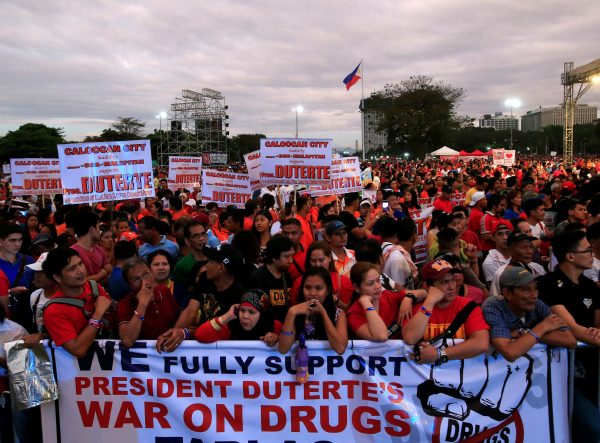On the domestic front, Duterte has pressed ahead with a brutal crackdown on illegal drugs, which has reportedly claimed an average of 1000 lives every single month. The Philippine government though argues that the number of casualties is far lower. Despite the reported death toll, Duterte’s signature war on drugs remains popular at home, and the vast majority of the population continues to support him. Surveys suggest that the majority of the population also supports Duterte’s highly controversial effort to restore the death penalty as a supposed deterrence against crime. Almost overnight, the Philippines has transformed from a bastion of liberal democracy to a case study for strongman populism in Southeast Asia.
Duterte’s iron-fisted style of governance seems to have struck a chord across the region. Months earlier, Indonesia’s police chief Budi Waseso unabashedly contemplated a Duterte-style approach to the drug problem in his own country, while Brunei’s Sultan Haji Hassanal Bolkiah — an absolute monarch and long-time friend of Duterte — has advocated closer bilateral and regional cooperation on the issue.
But human rights groups and the West are beginning to pushback. Jude Sabio — a human rights lawyer from Duterte’s home island of Mindanao — recently sought to initiate a criminal case at the International Criminal Court by accusing the Filipino president of breaching international humanitarian law.
Agnes Callamard, the United Nations Special Rapporteur on Extrajudicial, Summary or Arbitrary Executions, recently visited the Philippines where she condemned Duterte’s allegedly ‘ill-conceived’ anti-drugs policy, which ‘foster[s] a regime of impunity’.
Amid growing concerns over the state of human rights in the Philippines, the European Union is expected to adopt punitive sanctions, including raising tariffs on Philippine exports. The United States will also likely cancel its US$434 million Millennium Challenge Corporation aid package to the Philippines.
Relishing his newfound role as the (rotational) chairman of ASEAN, Duterte has called upon the West to ‘learn to respect’ regional states and treat them as ‘sovereign equals’. Amid growing tensions between the Philippines and Western partners, Duterte has pressed ahead with his second major policy shift: a high-profile pivot to China. In a strange turn of events, the Philippines has defiantly stood up to its Western allies, while openly acquiescing to its former rival.
To be fair, the foundations of the Philippine–US alliance have withstood Duterte’s fiery rhetoric and increasingly open strategic flirtation with China, who has offered large-scale economic incentives to woo Washington’s oldest treaty ally in the region. Yet the Filipino president has noticeably scaled back military cooperation with the United States, a country that he has blatantly vilified based on decades of personal resentment and ideological animosity.
For instance, Duterte has cancelled major joint military exercises, namely the US–Philippine Amphibious Landing Exercise and the Cooperation Afloat Readiness and Training Exercise. He has also barred American naval vessels from using Philippine bases for freedom of navigation operations in the South China Sea, cancelled plans for joint patrols in the South China Sea; and blocked America’s request to develop and utilise the Bautista Airbase in Palawan, which lies close to disputed land features in the Spratly Islands.
Meanwhile, the Philippines is exploring joint naval exercises and long-term military agreements with both China and Russia. To the chagrin of many in the Philippines and across the region, Duterte also used his ASEAN chairmanship to veto any direct or indirect criticism of Chinese activities in the South China Sea.
In the ASEAN joint statement, regional states such as Vietnam strongly advocated for the inclusion of the issue of massive Chinese reclamation activities and corresponding militarisation, thanks to China’s establishment of a sprawling network of airbases in contested waters. Domestically, many Filipinos hoped that the president would raise the Philippines’ landmark arbitration case at The Hague, which nullified the bulk of expansive Chinese claims across the South China Sea.
But the final statement featured neither any mention of The Hague ruling nor the issue of reclamation and militarisation. As one regional diplomat told the Filipino media: ‘Some are frustrated over the turn of events’. A Filipino official was equally perturbed, lamenting how his country is now ‘being lumped together with Cambodia and Laos in protecting Chinese interests [in ASEAN] at all costs’.
In exchange for protecting China in multilateral fora, Duterte will likely seek bilateral concessions in the shape of infrastructure investment or joint development schemes in the South China Sea. These requests will probably be made during his upcoming meeting with President Xi Jinping on the sidelines of the Belt and Road Initiative summit in mid-May. Duterte’s transactional approach may strengthen the Philippines’ hand but it has undermined ASEAN’s centrality in shaping the regional security environment.
Richard Javad Heydarian is Manila-based academic and author of Asia’s New Battlefield: US, China and the Struggle for Western Pacific.


Heydarian, the EU will support Duterte’s war on drugs providing money for rehab. It’s 2,900 deaths related to police operations on drug war, not 1,000 every month. Don’t include natural deaths. Washington has invited Duterte. China, Russia and the US can park their destroyers here anytime. American aid is not needed. That’s a measly $434 million. Don’t worry like Agot, you will not go hungry. Just go to Duterte’s kitchen. The ICC is toothless. The US did not sign UNCLOS. Nobody can enforce it. Duterte will eventually take up the occupied features when the time is right, meanwhile he got good deals with China. China will agree with ASEAN code of conduct. RP belongs to Asia.